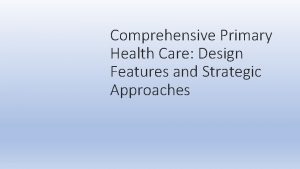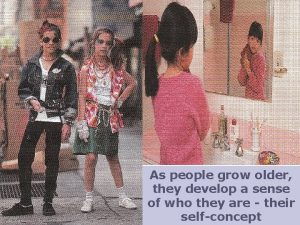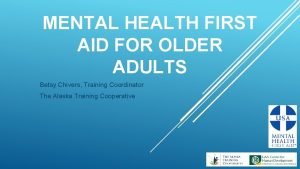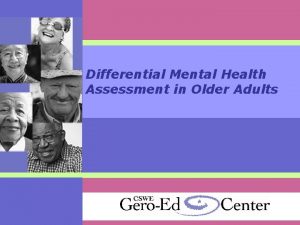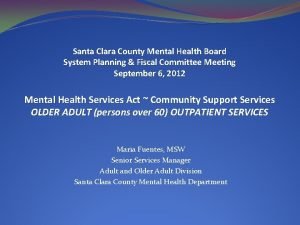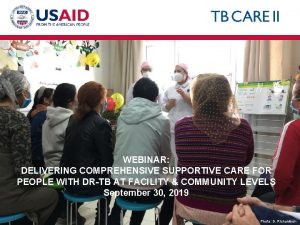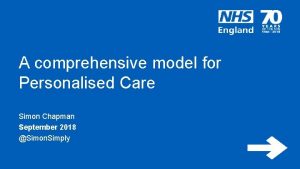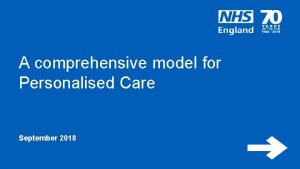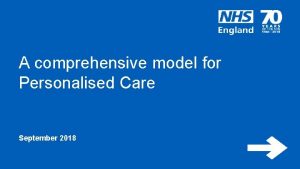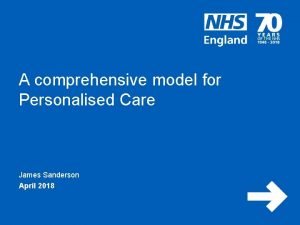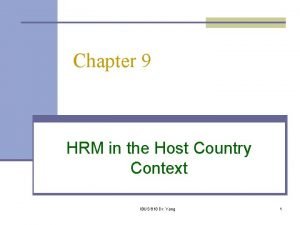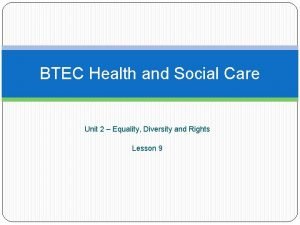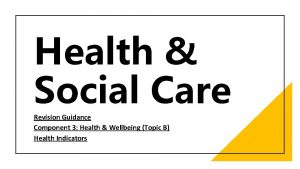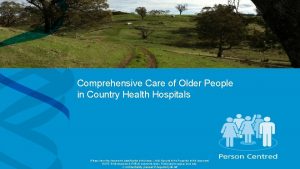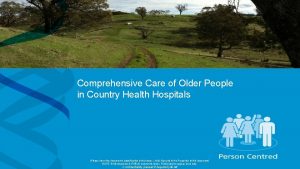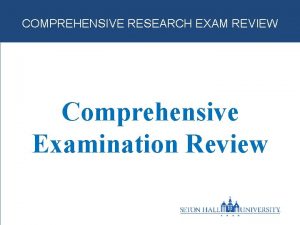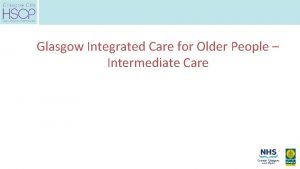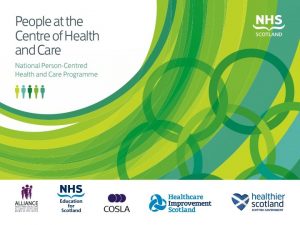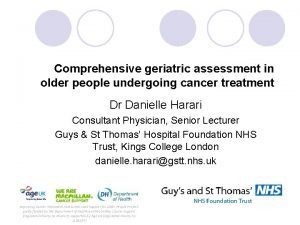Comprehensive Care of Older People in Country Health


















- Slides: 18

Comprehensive Care of Older People in Country Health Hospitals (Please insert the document’s classification in the footer – Arial-10 pt and in the Properties of this document) NOTE: If this document is PUBLIC delete this footer. Public label to appear once only. Confidentiality (caveat if required)-I#-A# SA Health

Comprehensive Care of the Older Person - prevents delirium and enhances care for those with CI > People with cognitive impairment admitted to hospital have a significantly increased risk of preventable complications, like delirium, falls and pressure injuries. > People with cognitive impairment may also experience distress in unfamiliar and busy environments. > Although cognitive impairment is a common condition experienced by people in health service organisations, it is often not detected, or is dismissed or misdiagnosed. SA Health

Implementing the CCo. OP Mo. C in CHSA • 2018/19 8 hospitals • Port Lincoln, Whyalla, Pt Augusta, Pt Pirie, Riverland General Hospital, Murray bridge, Mt Gambier, Gawler • Emergency department and acute medical wards • Education – clinical and non-clinical staff • Implement the CCo. OP Mo. C key priorities using the Dementia Care in Hospital Program from Ballarat Health Services • Share. Point SA Health

Comprehensive Care of Older People – model of care ………. will improve the care of older people (aged 65 and older or 45 and older for Aboriginal or Torres Strait Islander) in South Australian public hospitals. Aligns with National Standard 5. The project involves implementing five key priorities: 1. Optimising the care that is provided to older people in the Emergency Department (ED), including that delivered in the lead-up to and ED presentation 2. Improving the standard of hospital care delivered to older people with cognitive impairment 3. Creating a document for a patient to take home at the time of hospital discharge ‘ You are leaving hospital’ 4. Maximising the discharge summary completion rate 5. Collection and dissemination of timely, relevant and accurate performance data to the teams providing care through the use of key performance indicators. SA Health

Why it matters? Michael's Story Highlight Michael’s Story- right click – open hyperlink Part 1 Part 2 Michael is the father of four children aged 17 to 25, all of whom live at home. Working as a criminal barrister, Michael was diagnosed with early onset Alzheimer’s disease at the age of 49. Three years on and still in the early stages of his condition, Michael retains insight and articulately shares his thoughts and feelings from within the disease. Michael’s story is from The Long Goodbye which was aired earlier this year on ABC 1. If you would like a copy of the film please visit Ronin Films. SA Health

Priority 1 Encouraging appropriate use of emergency departments and identifying alternatives to hospital admission where appropriate. • Screen for Cognitive Impairment using the 4 AT • With patient/carer/family/SDM consent use of the Cognitive Impairment Identifier • Optimise the environment • Referral pathways SA Health

4 AT – Screening Tool SA Health

4 AT • Score of 1 -3 indicates CI • Score of 4+ positive for delirium • With patient/carer/family/SDM consent use of the Cognitive Impairment Identifier SA Health

Priority 2 Developing standards of care for patients with cognitive impairment. q CHSA Cognitive Impairment Guideline q EBP delirium management q Best practice heath service provision for patient with Dementia Also during acute admission if identified with CI with patient/carer/family/SDM consent use of the Cognitive Impairment Identifier SA Health

Priority 3 Creating a discharge information brochure for patients to take home at the time of discharge. ‘You Are Leaving Hospital’ SA Health

SA Health

Priority 4 Maximising discharge summary rates. Improving discharge summary completion and distribution optimises: q Care across transitions q Health outcomes q Reduces risk of readmissions SA Health

Priority 5 Collecting and disseminating timely, relevant and accurate performance data to ensure continuous quality improvement. Data to include: q 28 day readmission q Hospital acquired condition q Relative Stay Index q Length of Stay q Discharge to Aged Care SA Health

Cognitive Impairment Identifier • The CII was developed by the Alzheimer's community. Those living with Dementia and their carers/family. • They saw it as important that health service staff could see their specific needs at a glance and this supported the delivery of health care that met the individuals needs. • It is not a label to go on the person but a indicator to inform care. Like ‘nil by mouth’ or ‘requires 1 assist to mobilise’ SA Health

Cognitive Impairment Identifier What does this mean? • The patient with this symbol on the wall above their bed or on the end of the bed has a cognitive impairment • The patient and/or carer, family, substitute decision maker have consented to the use of the CII • All staff clinical and non-clinical can improve how we interact and provide the best health care for this patient knowing this SA Health

Cognitive Impairment Identifier How can we improve our care? • Introduce yourself each time you go in their room • Make sure you have eye contact when you are speaking with them • Remain calm and talk in a matter of fact way – keep things uncomplicated, reassure, kindness • Involve carers - if they are in the room with you • Focus on one instruction at a time if your asking them something • Give time for responses • You might need to repeat yourself… don’t assume you have been understood • Do not give too many choices SA Health

Dignity in Care Principles > Zero tolerance of all forms of abuse. > Support people with the same respect you would want for yourself or a member of your family. > Treat each person as an individual by offering personalised service. > Enable people to maintain the maximum possible level of independence, choice and control. > Listen and support people to express their needs and wants. > Respect people’s privacy. > Ensure people feel able to complain without fear of retribution. > Engage with family members and carers as care partners. > Assist people to maintain confidence and a positive self-esteem. > Act to alleviate people’s loneliness and isolation. SA Health

Comprehensive Care of Older People We all have a role in making a difference. What you do counts. Thank You SA Health
 Life is older than the trees
Life is older than the trees Comprehensive primary health care definition
Comprehensive primary health care definition As people grow older
As people grow older Mental health and older adults
Mental health and older adults Mental health and older adults
Mental health and older adults Older adults mental health
Older adults mental health Primary secondary tertiary care definition
Primary secondary tertiary care definition Comprehensive care plan
Comprehensive care plan Comprehensive model of personalised care
Comprehensive model of personalised care Comprehensive model of personalised care
Comprehensive model of personalised care Comprehensive personalised care model
Comprehensive personalised care model Comprehensive model of personalised care
Comprehensive model of personalised care Host country and home country
Host country and home country Intra country vs inter country
Intra country vs inter country Unit 2 equality diversity and rights
Unit 2 equality diversity and rights Health and social care component 3 health and wellbeing
Health and social care component 3 health and wellbeing The group of people who officially control a country
The group of people who officially control a country Verbal irony in the life you save may be your own
Verbal irony in the life you save may be your own Key issue 2: where do people migrate within a country?
Key issue 2: where do people migrate within a country?

